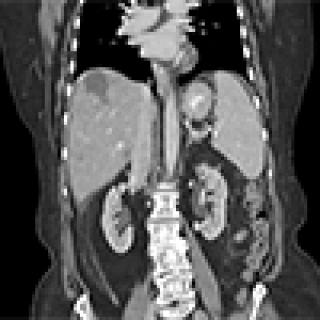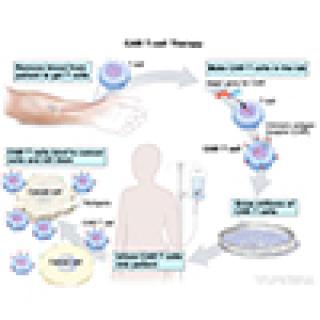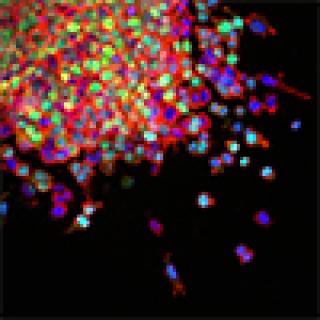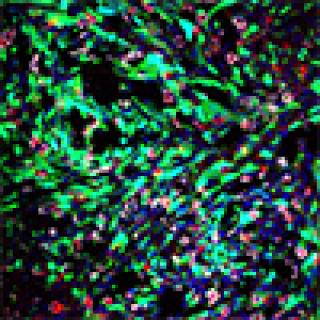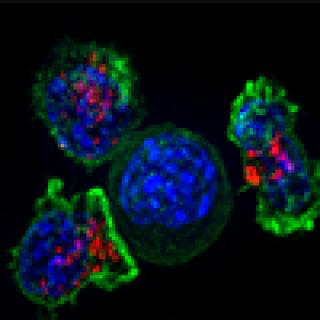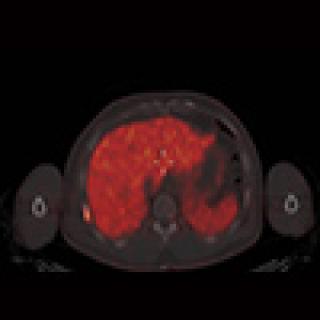Clinical Trials
Clinical trial tests combination immunotherapy for genitourinary tumors
Andrea B. Apolo, M.D., of the Genitourinary Malignancies Branch, is leading a study to recruit patients with each of the nearly 40 rare genitourinary malignancies and treat them with a combination of chemotherapy and immunotherapy drugs.
Read MoreSide effects of CAR T-cell therapy are dramatically reduced with new receptor
A new immunotherapy for lymphoma has been found to cause lower levels of neurologic toxicity than other T-cell therapies for lymphoma. The findings come from the first clinical test of a CAR T-cell therapy using a new anti-cancer T-cell receptor developed in the Center for Cancer Research.
Read MoreNow recruiting: Combination therapy clinical trial for small-cell lung or small-cell extrapulmonary cancers
Anish Thomas, M.D., of the Developmental Therapeutics Branch, is leading a study of a drug combination to treat small-cell lung cancer that has come back after treatment as well as small-cell cancer that started at a site other than the lungs (extrapulmonary). Small-cell lung cancer is an aggressive, fast-growing type of lung cancer.
Read MoreClinical trial investigates IV administration of vaccine for advanced solid tumors
Marijo Bilusic, M.D., Ph.D., of the Genitourinary Malignancies Branch, is leading a clinical trial to test whether giving the MVA-BN-brachyury vaccine intravenously is safe for humans and has no intolerable side effects. The goal of the study is to see whether intravenous MVA-BN-brachyury vaccine can shrink tumors and slow or prevent the spread of cancer to other parts of the body.
Read MoreFDA grants orphan drug designation to zotiraciclib for the treatment of glioma
The U.S. Food and Drug Administration granted orphan drug status in December to zotiraciclib for use in patients with glioma, a cancer of the brain that begins in glial cells (cells that surround and support nerve cells). This designation is based on results from an ongoing NCI-sponsored phase 1 trial led by the CCR Neuro-Oncology Branch at the NIH Clinical Center.
Read MoreFDA grants orphan drug designation to zotiraciclib for the treatment of glioma
The U.S. Food and Drug Administration granted orphan drug status in December to zotiraciclib for use in patients with glioma, a cancer of the brain that begins in glial cells (cells that surround and support nerve cells). This designation is based on results from an ongoing NCI-sponsored phase 1 trial led by the CCR Neuro-Oncology Branch at the NIH Clinical Center.
Read MoreJay Berzofsky and Hoyoung Maeng discuss new vaccine to help men with prostate cancer
Jay Berzofsky, M.D., Ph.D., Chief of the Vaccine Branch, and Hoyoung Maeng, M.D., Assistant Research Physician in the Vaccine Branch, recently discussed their ongoing work to design and develop vaccines and immunotherapy for cancer prevention and treatment with Cancer Therapy Advisor. They share how they are testing a vaccine that may one day delay the need to use androgen deprivation therapy (ADT) in prostate cancer patients.
Read MoreFormer Pediatric Oncology Branch patient donates toys to NIH Pediatric Clinic
In December, former patient Julie Jones donated over 1,000 toys to the Pediatric Clinic at the NIH Clinical Center. Jones is a former patient in the Pediatric Oncology Branch who was treated more than 20 years ago for alveolar rhabdomyosarcoma. She says, “I remember what it was like. What these children are going through at such a young age really breaks your heart. I’ve often said there’s nothing greater than seeing the smile on the face of a sick child.”
Read MoreClinical trial evaluates T-cell therapy for advanced mesothelin-expressing cancers
Some cancer cells express a higher-than-normal amount of mesothelin, which makes them more likely to multiply and spread to other parts of the body. Raffit Hassan, M.D., of the Thoracic and GI Malignancies Branch, is leading a trial that tests T-cell immunotherapy for patients with cancer of the lung and its lining, ovarian cancer and bile duct cancer that express high levels of mesothelin.
Read MoreClinical trial will test radiotracer imaging for high-risk localized prostate cancer
Many men with prostate cancer are diagnosed at an early stage of the disease when the cancer is confined to the prostate. However, about 20 percent are diagnosed with high-risk disease, which tends to spread, or metastasize, to other parts of the body. William Dahut, M.D., Senior Investigator in the Genitourinary Malignancies Branch, is leading a study using positron emission tomography/computed tomography (PET/CT) with radioactive material to try and identify places in the body where prostate cancer has spread.
Read More